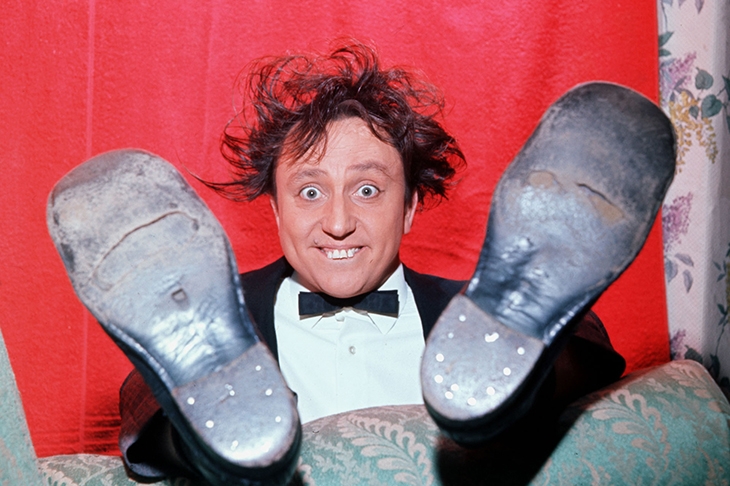Doddy! Thou shouldst be living at this hour. England hath need of tickling sticks. So also hath the rest of the UK. At this time of political uncertainty, laughter is the one reliable panacea for all anxiety. Louis Barfe’s industriously thorough, entertaining biography of the late Sir Kenneth Arthur Dodd, written with admiration verging on hagiography, portrays the comic genius who was the last performer to uphold this country’s tradition of vaudeville in music hall, on radio and television.
Dodd was born in 1927 in Knotty Ash, as the village was developing to become a suburb of Liverpool. He was brought up, with an older brother and a younger sister, by adored, adoring parents, and Ken said his father was the funniest man he ever met. They lived in a substantial old house, which remained Ken’s home until he died 90 years later. The long continuing security and affection helped to maintain his characteristic self-confidence and benevolence. His fantastic imagination coloured his community with kipper trees, jambutty mines, black pudding plantations and a Diddy language enriched by words such as ‘tattyfilarious’, ‘goolified’ and ‘discumknockerated’.
Ken could rave for four hours or more, often continuing after midnight, leaving his fans limp with laughter
Ken’s father was an independent coal merchant who sometimes continued to deliver coal until late in the evening. Ken was convinced that working hard and independence were normal. He always insisted on keeping control of everything he considered important, especially scripts and money. He undertook his first venture into show business, a solo act, aged ten. Inspired by an advertisement in a comic for Ventrilo (price sixpence, p&p. a penny halfpenny extra), he was able to put a gadget in his mouth to throw his voice. His father bought him a dummy in sailor’s uniform, plus a naval officer’s uniform for the ventriloquist, to perform for local children for a shilling each.
Ken left school at 16 and helped his father deliver coal, then sold household goods from a van, while finding occasional gigs as a comedian and singer of romantic ballads. He had a strong, pleasant tenor voice. In 1954 he took the plunge into full-time professional entertainment. Although gentle and kind by nature, he contrived to give a public impression of what a Guardian critic called ‘the glorious gift of comic insanity’. His bizarre persona in performance was exaggerated by his wildly entangled black hair, pop eyes and protruding front teeth. The book presents excellent photographic evidence of his public appearances, culminating in 2003 in Andy Hollingworth’s marvellously extreme close-up of Dodd as the crazy spirit of comedy.
He was not a mere reciter of written jokes, old and new; he was a talented, grotesque actor. The style of his long monologues was genially aggressive. His enthusiasm and stamina were unlimited. He could rave uninterruptedly for four hours or more, often continuing after midnight, until his audience was limp with laughter, utterly overwhelmed. His fans, not only up north but eventually all over Britain, liked being overwhelmed.
His admirers included the Queen, Margaret Thatcher (who had drinks with Ken after a show and wrote a thank-you note calling him ‘wonderful’), Harold Wilson and even fellow comedians. Bob Monkhouse praised him as a ‘creator of superb absurd vulgarity’. The tickling stick, derived from a burlesque charwoman’s feather duster, was magically irresistible. There was back-handed intimation that it was phallically symbolic. Open-minded about his art, Ken was not averse to joking about religion, but promised: ‘I won’t tell crucifixion jokes.’
Backed up by his colleagues the Diddymen, Ken attained his apotheosis in seasons at London’s Palladium, the venue of Royal Variety Performances. His great range of activities is catalogued in what the author calls ‘Doddology’, ‘an extensive but not exhaustive’ appendix that lists all the producers, writers, performers and other personnel who accompanied Ken on his missions to brighten our lives.
Ken was loyal to Liverpool and Liverpudlians and to the two principal women in his life, his long-term fiancées, and they, in turn, loyally supported him. After being tried for income tax evasion, and paying the Inland Revenue almost £1 million, he was still able to sing ‘Happiness’, his popular signature song, and continue to appreciate the chart-topping success of ‘Tears’. Lester Piggott had spent three years in prison for a shadier case of tax fraud and he had lost his OBE. Ken, astonishingly unhumiliated, was able to get on with his career, more in demand than ever. Two days before his death on 11 March 2018, he married his faithful partner Anne, to make her Lady Dodd, and left her £27.7 million — thus avoiding the 40 per cent inheritance tax: the ultimate tickle, the last laugh.






Comments